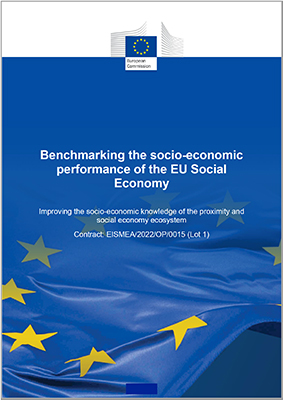CIRIEC and the European Research Institute on Cooperative and Social Enterprises (EURICSE) will present the new report on the Social Economy in the EU at an event organised by the European Economic and Social Committee (EESC) in Brussels on 7 February. The report, promoted by the European Commission in the framework of the Social Economy Action Plan, puts the number of people employed in the Social Economy in the EU at 11.5 million, through 4.3 million enterprises and organisations.
The study, published under the title ‘Benchmarking the socio-economic performance of the EU Social Economy: Improving the socio-economic knowledge of the proximity and social economy ecosystem’, was carried out jointly by EURICSE and CIRIEC, following a public call for tender launched by the Executive Agency for the European Innovation Council and SMEs (EISMEA).
The research project involved around 50 experts from the 27 EU Member States, under the coordination of a core team of experts from EURICSE and CIRIEC. The EURICSE experts were Giulia Galera, Chiara Carini, Barbara Franchini and Giulia Tallarini and CIRIEC experts were Rafael Chaves Ávila, Barbara Sak and Jérôme Schoenmaeckers. Silke Haarich and other experts from Spatial Foresight also collaborated in the project’.
The report was first made public for the first time when Professor Rafael Chaves presented it at the 34th CIRIEC International Congress on the Public Social and Cooperative Economy, held last October in Costa Rica.
Official presentation with guests of honour
The launch event in Brussels will feature welcoming remarks by Giuseppe Guerini, President of CECOP-CICOPA Europe, the European Confederation of Industiral and Service Cooperatives, and Justyna Kalina Ochędzan, President of the Working Community of Associations of Social Organisations WRZOS.
This will be followed by the presentation of the report by its authors: Rafael Chaves Ávila, CIRIEC; Chiara Carini and Giulia Gallera, EURICSE; and Bonifacio Porras García, Head of the Proximity, Social Economy and Creative Industries Unit, DG GROW.
This will be followed by the debate on the implications of the report, which will be led by Maravillas Abadía Jover, Member of the European Parliament (EPP, Spain); Irene Tinagli, Member of the European Parliament (S&D, Italy); Sarah de Heusch, Director of Social Economy Europe; Agnès Mathis, Director of Cooperatives Europe; and Hanna Surmatz, Policy Officer at Philea.
Highlights of the report
4.3 million enterprises and organisations, 11.5 million employees and more than 912 billion euros in turnover are the key figures for the social economy in the European Union, according to the report ‘Benchmarking the socio-economic performance of the EU social economy’.
The document argues that 97.7% of these enterprises belong to one of the four families that traditionally constitute the social economy (cooperatives, mutual societies, associations and foundations). In contrast, only 246,000 are social enterprises, of which less than 43,000 are ‘ex lege’ social enterprises and more than 203,000 are de facto social enterprises.
The report analyses the social economy, which includes cooperatives, mutual societies, associations, foundations and social enterprises. According to the data extracted from the report, by country, of the 11.5 million people employed in the European social economy, Germany leads the ranking with 3.4 million and France with nearly 2.6 million.
They are followed by Italy (more than 1.5 million employed in the social economy) and Spain (almost 1.4 million). Belgium (592,000 jobs in the social economy), Poland (250,000) and Portugal (245,000) follow a long way behind. In this report, unlike the previous ones, the case of the United Kingdom is no longer considered, since Brexit has taken place.







